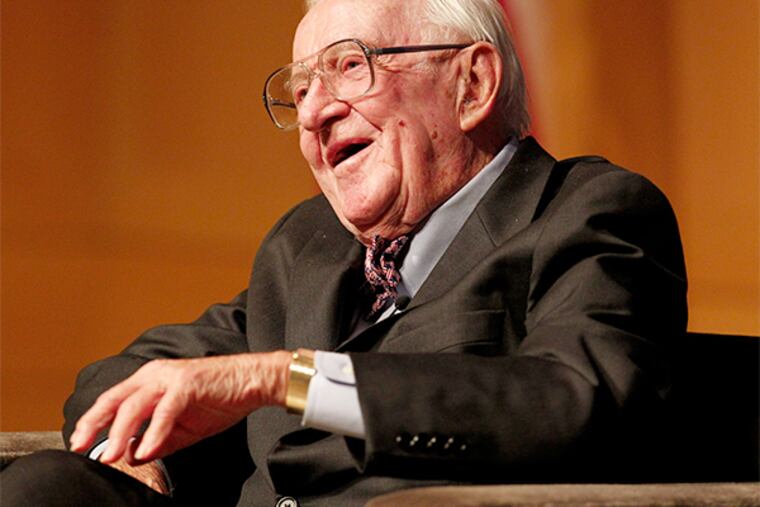Retired Justice Stevens talks about his 'Six Amendments'
Retired Supreme Court Justice John Paul Stevens looked back at his career and forward toward changes he would like to see made in the Constitution during an hour-long talk Monday at the National Constitution Center.

Retired Supreme Court Justice John Paul Stevens looked back at his career and forward toward changes he would like to see made in the Constitution during an hour-long talk Monday at the National Constitution Center.
Stevens, 94, who became a liberal pillar on the court, had high praise for Justice Sonia Sotomayor's dissent on the recent decision upholding a voter-enacted law in Michigan law barring the use of affirmative-action policies in state schools. He argued that such policies might gain more popular support if political leaders explained that they were needed to create a more cohesive society.
"She wrote an excellent dissent," Stevens said. "It was a powerful opinion."
Stevens retired from the court after 34 years on June 29, 2010, as the nation's second-longest-serving justice. He was appointed by President Gerald R. Ford, a Republican, and for a time was known as a center-right jurist, squarely in the Republican mold of the time.
But as the years progressed, his jurisprudence became increasingly liberal. While he once opposed affirmative-action programs, voting to strike down a minority set-aside program in 1980, he gradually changed his stance and voted to uphold an affirmative-action program at the University of Michigan law school in the 2003 decision Grutter v. Bollinger.
In the same vein, his views on First Amendment freedoms grew more expansive; he voted to strike down federal restrictions on online obscenity considered harmful to minors. Stevens said he was concerned about the effect of such materials on young people, but he suggested that it was up to parents to provide that protection and that he was troubled by the prospect of the government's employing criminal laws to uphold those standards.
On Monday, Stevens, on tour to promote his new book, Six Amendments: How and Why We Should Change the Constitution, said there were parallels between the prohibition on sales of alcohol in the 1920s and state and federal laws banning marijuana, in that both were ineffective.
Stevens, who regularly swims and plays tennis, seemed energetic throughout the talk, moderated by Brooke Gladstone of WNYC's On The Media.
In his book, Stevens proposes constitutional amendments that would set forth the federal government's power to regulate sale and ownership of firearms, impose limits on campaign contributions, and ban capital punishment. He also proposes a constitutional amendment to ban gerrymandering, the practice of drawing election districts that give one party an advantage.
"I propose that the Constitution be amended to make it perfectly clear that the courts have the same power to prohibit political gerrymandering that they have to prohibit racial gerrymandering," he said.
It takes two-thirds of both houses of Congress, or two-thirds of state legislatures, to propose a constitutional amendment; three-fourths of state legislatures must then approve the measure for it to be adopted. That, Stevens grants, is a high hurdle to clear, especially in the case of issues such as gun control, which is strongly opposed by many voters.
But he said public opinion can change very quickly, as it has on gay rights.
215-854-5957 @cmondics